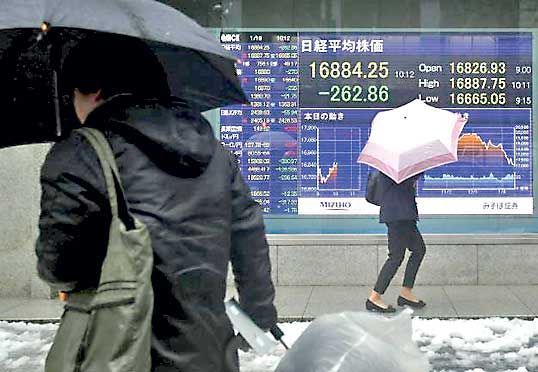Wednesday Feb 25, 2026
Wednesday Feb 25, 2026
Friday, 22 January 2016 00:00 - - {{hitsCtrl.values.hits}}
TOKYO (Reuters): Asian shares and the dollar surrendered their gains on Thursday as recently volatile crude oil prices seesawed lower, although European shares were still expected to mark opening gains.
Financial spreadbetters predicted Britain’s FTSE 100 to open up as much as 1.5%. Germany’s DAX was seen rising by as much as 1.1%, and France’s CAC 40 was seen advancing by as much as 1.2%.
S&P500 e-mini futures ESc1 were down about 0.6% in late Asian trade. On Wall Street overnight, an uptick in US crude oil from 2003 lows helped major indexes pull away from losses of more than 3%, but they still finished more than 1% lower.
The European Central Bank will take centre stage with its regular policy meeting later in the session. Central bank policymakers are expected to hold interest rates steady but highlight increasing risks to growth and inflation, while keeping the door open for further easing measures later this year.
“With last month’s December disappointment still fresh in the memory, ECB President Mario Draghi will have to convince the markets that the ECB has a plan, and the ammunition to cope with the further slide in inflationary pressures that is likely to ripple across Europe in the coming weeks,” said Michael Hewson, chief market analyst at CMC Markets in London. (http://www.cmcmarkets.com/en/)
Crude oil succumbed to added pressure on prices and its losses continued on Thursday.
The new front-month US March oil futures contract was down 0.7% at $28.15 a barrel, giving up an earlier rise. Brent crude dropped 0.6% to $27.72 in Asian trade.
MSCI’s broadest index of Asia-Pacific shares outside Japan erased early solid gains and teetered in and out of negative territory in afternoon trade. It was last down 0.5%.
Japan’s Nikkei average ended down 2.4%, adding to its 3.7% plunge in the previous session. The Shanghai Composite Index slipped 0.9%, while China’s bluechip CSI300 index was down 0.8%. It has lost around 15% since the beginning of the year.
David Dai, Shanghai-based investor director at Nanhai Fund Management Co, said fears of a prolonged bear market were, nevertheless, overdone.
“With stocks having fallen so much, much of the risk has been priced in and another free-fall is quite unlikely, although the chance of a sustainable rebound is slim,” he said.
The dollar index, which tracks the US unit against a basket of six counterparts, was down about 0.1% at 99.013.
The dollar turned back toward a one-year low against its perceived safe-haven Japanese counterpart on Wednesday.
The greenback shed about 0.1% to 116.75 yen after falling to 115.97 on Wednesday, undermined by US data.
US consumer prices unexpectedly fell in December, suggesting inflation was more sluggish than the US Federal Reserve believed.
Other Wednesday data showed a drop in housing starts and building permits last month, which led investors to pare expectations of further interest rate hikes this year.